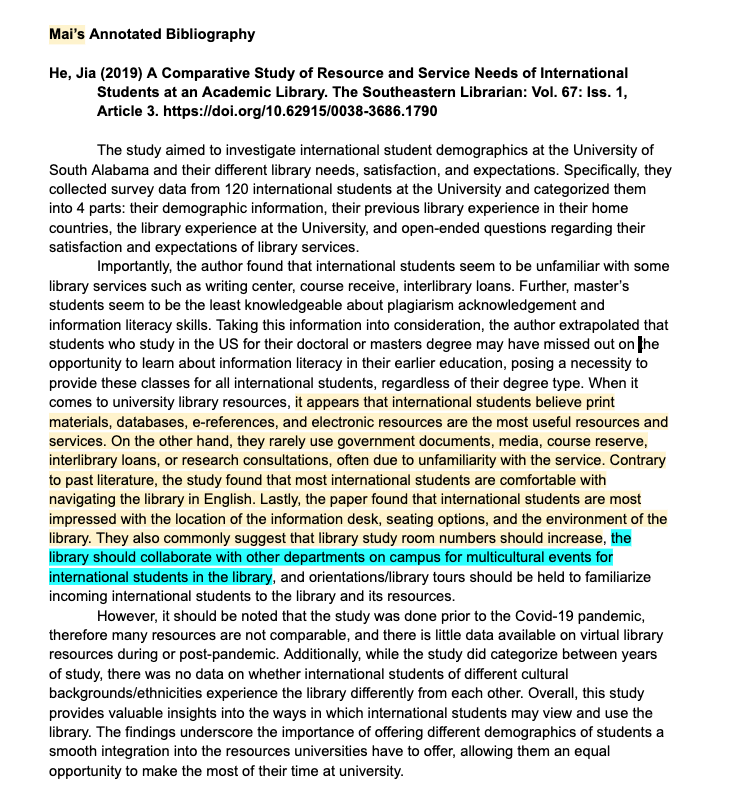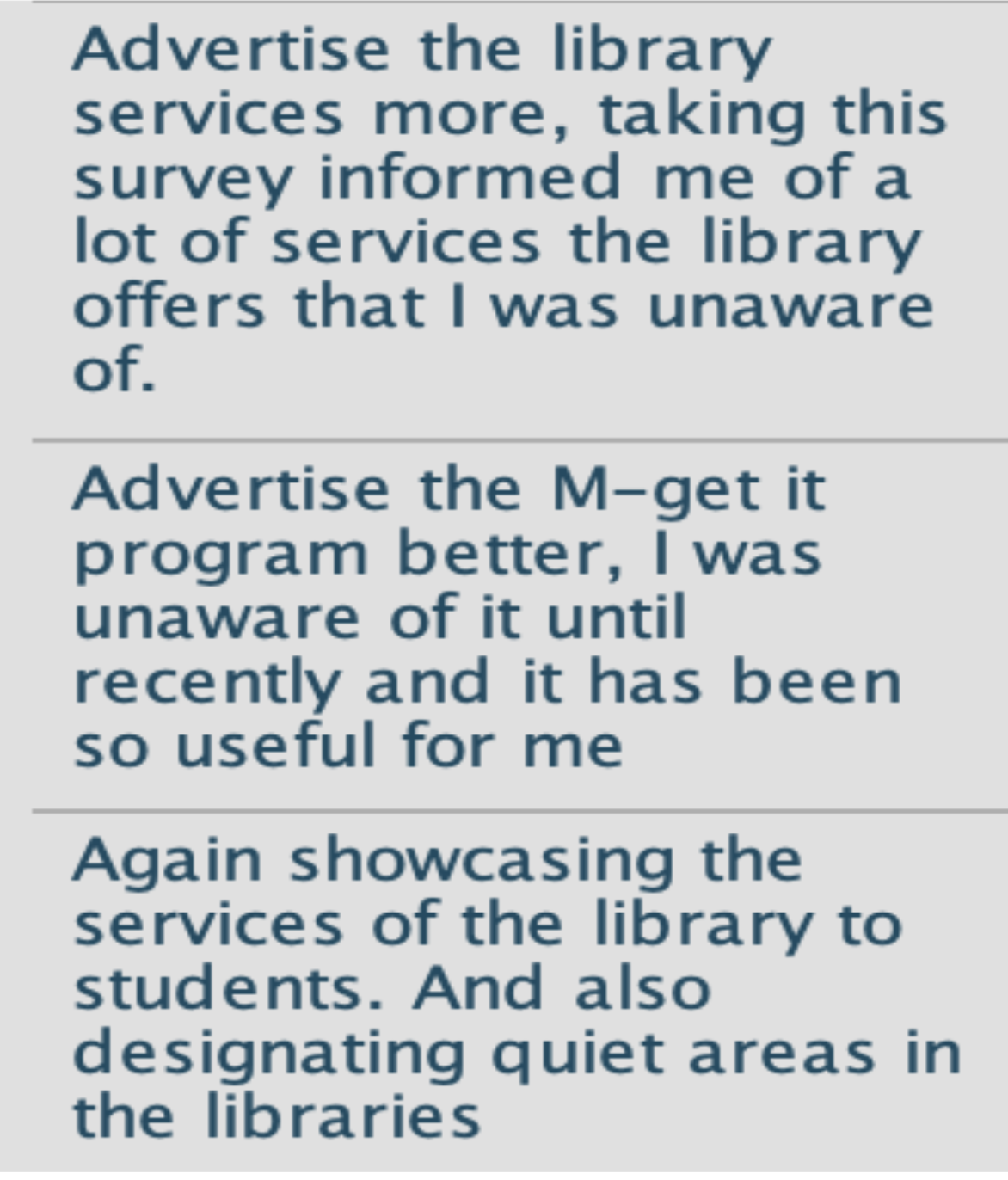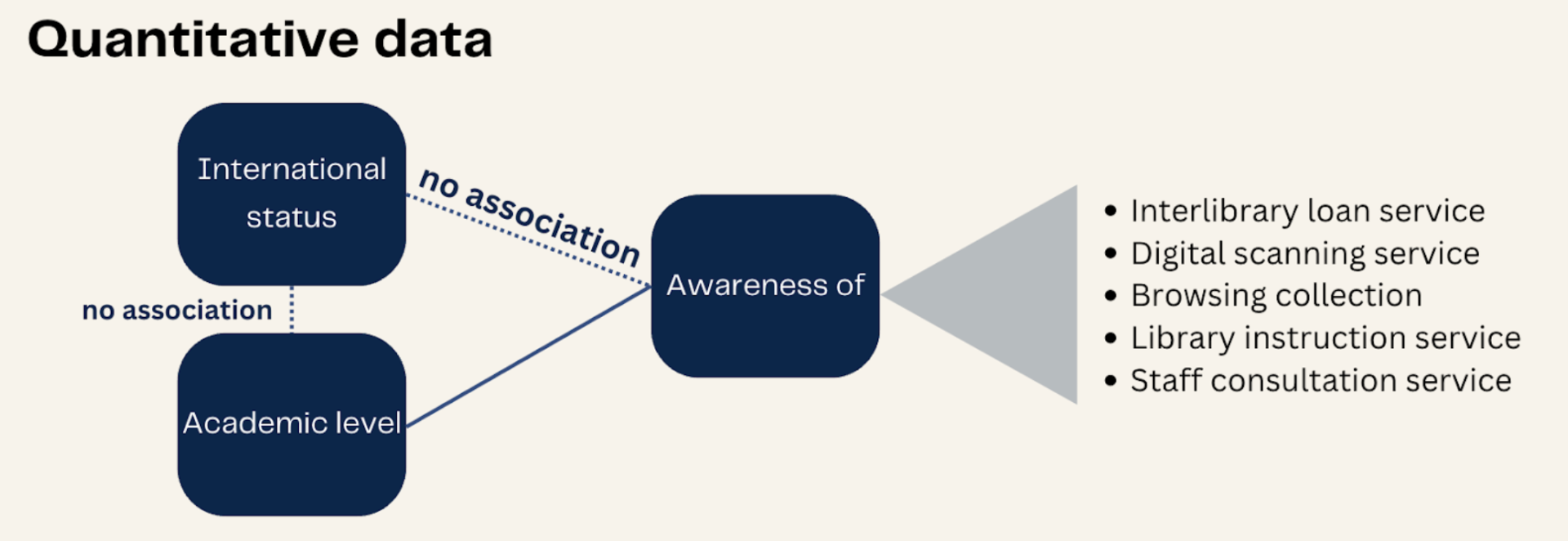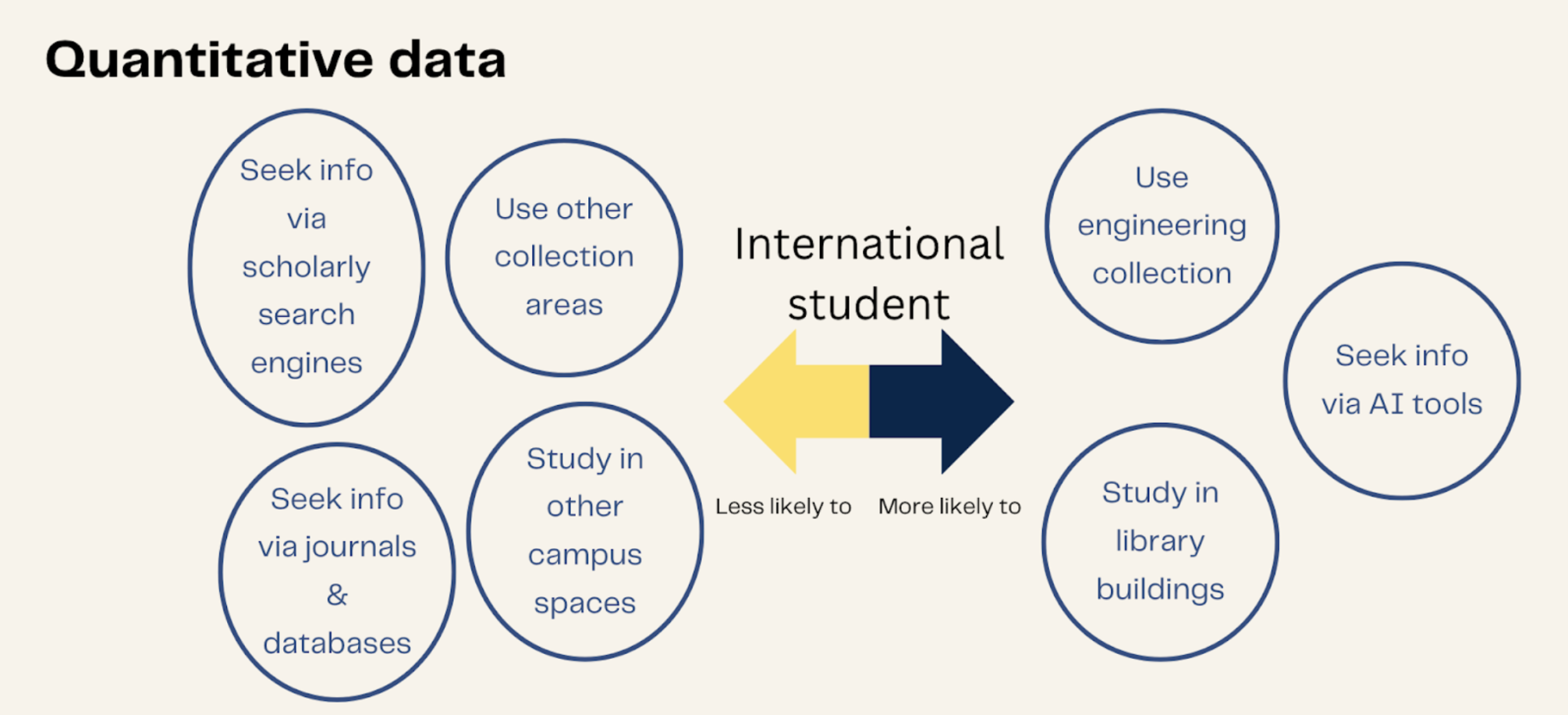I joined the University of Michigan Library this summer as a Michigan Library Scholar due to my interest in the one of the projects' focus on how international students do and don’t get their library-related needs met. As a Biopsychology, Cognition & Neuroscience major and an international student, I was eager to work with a detailed dataset and understand the perspectives of international students on library resources, which would allow me to stretch my data analysis skills and knowledge. I also hope to represent the experiences of members of my community through this internship, thus creating an opportunity for their voices to be heard.
Our project “How Do International Students Experience the U-M Library?” is based on the 2023 Library Campus Survey, the first campus-wide survey the library has ever conducted, with over 15,000 responses from various members of the University (students, staff, faculty, etc.). The survey aimed to learn about our community’s experiences and needs relating to library spaces, services, and materials, and our project focused on the international community. This is something I personally connected with when I first read its description, as an international student from Hanoi, Vietnam myself. The project’s scope and objectives attracted me to pursue the work, and provided a unique opportunity to represent my community while also developing the research skills I have honed through my work in psychological research throughout college. Through this role, I sought further experience in in-depth data analysis and the tools I can use to conduct research, and the soft skills necessary to succeed in a collaborative research environment. Most importantly, we as a team hoped to gain insights into the unique thoughts and experiences of international students, and therefore what we can do to provide them with a better experience interacting with the library.
To develop our research questions for this project, my fellow intern Paige and I conducted literature reviews to familiarize ourselves with the field of library science, through which I developed an interest in exploring the topic of information literacy. In short, information literacy refers to the ability to find, evaluate, use, and communicate information in various formats, most notably in situations requiring decision-making. It is an important skill to develop for any library user to successfully use the tools available in pursuing their issues of interest, whether that be conducting research, or reading books as a pastime. Past research has shown that international students especially struggle with this skill, perhaps due to unfamiliarity with the American academic library system, language barriers, or lack of knowledge about resources. During this phase of the project, we also got to tour the library, which introduced me to many resources I was previously unaware of, such as the various creation spaces and exhibit areas. This tour underscored the richness of the U-M library, while simultaneously making me wonder if other students on campus knew about these spaces and resources at all. Connecting this back to my literature search, I then considered: If students don’t know these resources exist, how would they even know how to address the issue of literacy? However, there is a distinct lack of literature available related to this research question. The problem of awareness arose for me: Why is no one talking about whether they’re aware of these resources in the first place? I certainly wasn’t. Looking at the written responses from undergraduate students in the survey data further cemented the importance of my query. Many undergraduate students stated that they too did not know about many of the resources they were asked about, or struggled to navigate library spaces.

My literature review document

International undergraduates' open-ended responses
Thus, I set out to determine whether students’ international status affects knowledge about library resources. My first hurdle was familiarizing myself with the dataset, which proved to be a fun challenge. As the data wasn’t equipped to directly answer my question, my mentor Craig and I decided to focus on variables related to common library resources for undergraduate students and manipulate them to reflect awareness levels. In the end, I managed to create my own variables, and got to analyzing. I discovered that international status does not affect undergraduates’ awareness as much as their academic level. Notably, first-year students are generally less aware of library resources than seniors, suggesting a need for better programming to inform incoming undergraduates of the resources the library can offer.

Figure 1. A model on the relationship between undergraduate students' academic level, international status, and their awareness of common library resources
Although this was a remarkable finding, I was still interested in exploring other aspects of international students’ information literacy. Again, while we lacked precise variables, I was able to examine usage patterns of popular library resources among international and domestic undergraduates. This information may help expand our findings beyond awareness, as patterns of usage may indicate students’ familiarity and/or comfort with materials and resources, thus helping me further speculate on the issue through a new lens. Interestingly, there are many noticeable differences in service use: a higher percentage of international students use the library’s Engineering collection than their domestic counterparts; international students are also more likely to use AI as a searching tool for their class assignments, and less likely to use academic journals and databases overall.

Figure 2. A model representing international undergraduates' usage patterns for common library resources
These behavioral patterns inspired us to continue exploring why they occur and how to reduce these differences among student demographics. While our project deliverables are limited, given the insights we have gained, my team and I hope to extend the dissemination of our findings to conference presentations or publications in academic journals. Additionally, we can now use this data to implement changes to the library’s tools and materials, along with strategies to educate our university population about these resources. As stated within the project’s mission, we aim to use these data to inclusively adapt the library to diverse audiences with differing perspectives, backgrounds, and needs. I am immensely grateful to have contributed to this incredibly impactful project, helping to make the library accessible and safe for my fellow international students specifically, and the U-M community at large.
Personally, I learned so much about myself, my interests, strengths, and areas for growth during my time working on this project. I developed invaluable skills in project management, accessibility, and learned many new data analysis methods, thus improving my quantitative analysis and developing skills for qualitative analysis. Equally significant, this internship experience has also driven me to become more productive, creative, and flexible in the research process, teaching me to get comfortable with the dataset and making the data work for my questions. I was also more familiarized with the process of presenting my research findings to a general audience, a skill I find especially useful in my other research endeavors. Most importantly, however, working with my amazing mentor Craig and a collaborative teammate such as Paige redefined how I view empirical research. From my team members’ expertise and passion, I learned to appreciate the role qualitative data plays in enriching my research. Under Craig’s guidance, I also came to understand the significance of my findings beyond the p-value, and the impact they can have on the school system and within the research field at large. I grew from being unsure of what I can deliver to recognizing important patterns that would inform U-M library’s future decision-making processes, which in turn made me really proud of the work I had done.